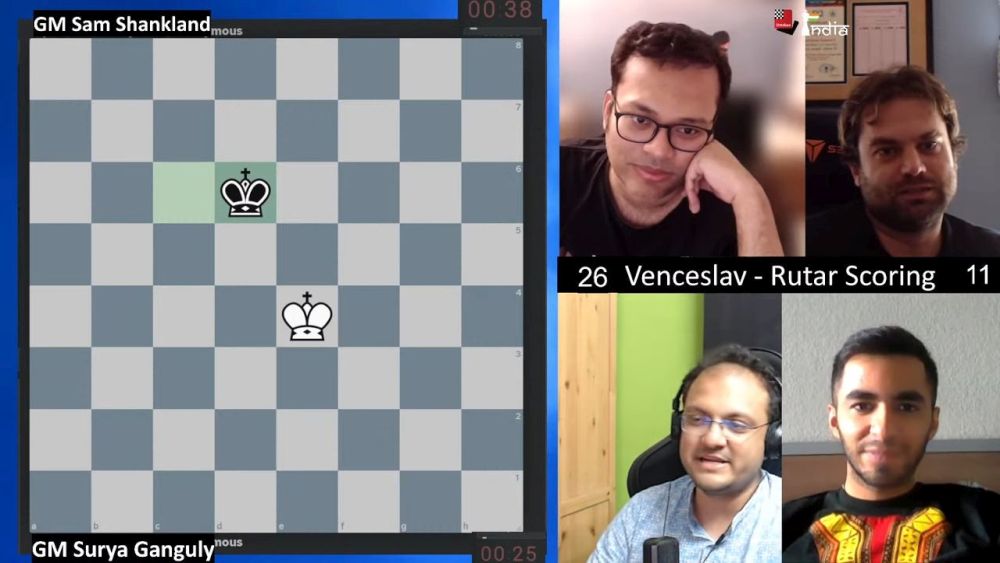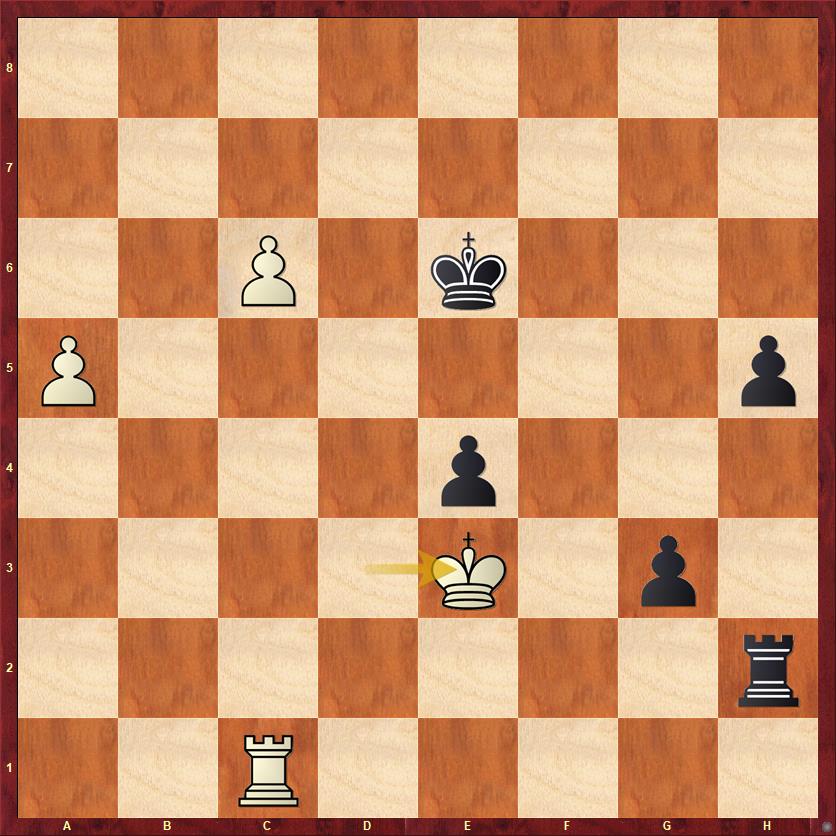Surya Ganguly wins the Venceslav Rutar Scoring System match against Sam Shankland
GM Surya Sekhar Ganguly defeated GM Sam Shankland in their 8-game online match following the Venceslav-Rutar Scoring system, a brand new scoring system devised by Venceslav Rutar which changes the scoring of draws into three categories based on the material disparity - Favored draw, Disfavored draw, Equal draw. Surya won the match with a margin of 26-11 points, scoring 5 wins. Sam managed to score 1 win, and 3 games ended in equal draws. The total prize fund of the match was USD 5000 - Surya received USD 2000 for winning the match, and Sam USD 1000. The remaining USD 2000 was divided proportionally among the players according to the number of wins and draws. While there were no favored/unfavored draws in the match, it surely advocated for fighting chess as we got to see so many interesting games! Read the full report of the final day below
Recap of Day 1
GM Surya Sekhar Ganguly took the lead by scoring 17 points (3 wins and 1 equal draw) against GM Sam Shankland. The first game featured missed chances and beautiful tactics, but Surya capitalized on a blunder by Sam (Ba3) to dominate. In the second game, Sam missed a winning attack and suffered a significant loss. The third game was an interesting end game with Bishop+3 pawns against the Rook. It was a very hard position for Sam and Surya ended up winning the game. However, the fourth game was a much-anticipated result for the fans as it was an equal draw. After the games, the event organizer, Venceslav Rutar joined the stream and shared his opinion. Read all about Day one here.
Day 2 of the match - Surya defeats Sam Shankland with a 26-11 score
Surya continued his form from the last day, and closed the match itself by winning the 5th game - Sam Shankland had no way of coming back in the match. But as was decided beforehand, the games went on - as the main idea of the match was to test out how the Venceslav-Rutar scoring system plays out. USD 2000 was up for grabs! Game 6 was a draw, and Sam Shankland struck back to score his only win of the match on game 7. The 8th and last game of the match was an absolute rollercoaster where both players had winning positions at some point, but the game finally ended in a draw. Surya won the match with a 26-11 score against Sam!

The total prize fund of the match was USD 5000 - Surya received USD 2000 for winning the match, and Sam USD 1000. The remaining USD 2000 was divided proportionally among the players according to the number of wins and draws.

Game 5: Sam Shankland vs Surya Sekhar Ganguly: 0-5
Sam created a very sharp position out of the opening from the Bogo-Indian system. It was a question of who will break through first on the Kingside - and it was Surya who did it first:

Surya broke through with the very nice combination 21...Rxf3! 22. Qxf3 Qh2+ 23. Kf1 Ngxf2! 24. Bxf2 Nd2+! to win the White Queen. Surya went on to win comfortably with the Black pieces!
Game 6: Surya Sekhar Ganguly vs Sam Shankland: 2-2
This game was more or less a stable draw, but with a big missed chance in the Opening. See if you can find it:

Game 7: Sam Shankland vs Surya Sekhar Ganguly: 5-0
This was the best game of the match played by Sam, and the only game he won. He outplayed Surya right from the Opening, and scored a comfortable win.
Game 8: Surya Sekhar Ganguly vs Sam Shankland: 2-2
This was an up-and-down game with many chances for both. Surya got a completely winning position in the Rook endgame, but made an unfortunate blunder. Can you spot the problem with this?

The Format of the Match
It’s a two-day event which started on the 2nd of September. There were four games played on the first day and four played on the second day. The time control is 15 minutes + 5 seconds increment starting from the first move. There are 5 points for each win, 2 points each for an equal draw, 3 points for a Favored Draw, and 1 point for a disfavored draw.
The Venceslav Rutar Scoring System was developed to make draws fair for both the players. The point system for this event was follows:
| Outcome | Points |
| Win | 5 |
| Favored Draw | 3 |
| Equal Draw | 2 |
| Disfavoured Draw | 1 |
| Loss | 0 |
When the game is declared as a draw, the tournament director will count all the pieces on the board. The material balance is calculated by adding values as follows:
| Piece | Points |
| Pawn | 1 |
| Knight | 3 |
| Bishop | 3 |
| Rook | 5 |
| Queen | 9 |
The player who has more pieces on the board (material advantage) would get 3 points (Favoured draw) and the other player would get 1 point (Disfavoured Draw). If the material advantage is the same for both players, then both would get 2 points.
| Scenario | Result |
| Rook against Bishop | Favoured Draw (5 vs 3) |
| Rook against Bishop + Pawn | Favoured Draw (5 vs 4) |
| Rook against Bishop + 2 Pawns | Equal Draw (5 vs 5) |
This system does not change the following possibilities that result in a draw:
- Agreement between players
- Bare kings -Stalemate
- 3-fold repetition
- 50 reversible moves in a row
Replay Round 5-8 games
Few Questions After the Event:
1. Can the Venceslav Rutar Scoring System Be Used in Future Tournaments?
This scoring system has sparked interest because it encouraged players to avoid draws. Could this be the future of exciting chess tournaments?
2. What Was Surya Drinking During the Matches?
We noticed Surya’s brilliant moves followed each sip of his mystery drink. Fans are now eager to discover this "magic potion" that might boost their own game!

3. How much does Opening and endgames really change with this scoring system?
As both Surya and Sam mentioned after their games, they prepared very different openings from their usual repertoire. Surya mentioned that he was really hoping for a favored/disfavored draw and prepared specifically for it with the Black pieces, a move repetition where he would get the favored draw. But that didn't happen - in fact, the only two draws which happened in the match were equal draws. We need more number of favored/disfavored draws to actually see how it impacts the Opening and endgame theory!
We hope to find answers to these very important questions soon!
This article was edited by Himank Ghosh





